Top 10 Startups of the Month: July 2025 Edition

The most promising ventures are redefining industries in the UK and across the globe.
In innovation, timing is everything. And July 2025 wasn’t about promises — it was about traction.
From gravity-defying medicine to battery breakthroughs and underground acoustics, this month brought a wave of startups that didn’t just pitch change — they built it.
What unites them isn’t sector or size. It’s clarity. Each of these ventures delivered something real: a pilot, a product, or a partnership.
Some are fixing infrastructure. Some are reinventing health. One is making medicine in space.
Let’s dive in.
Top 5 UK Startups
1. Mint Innovation (West Midlands)
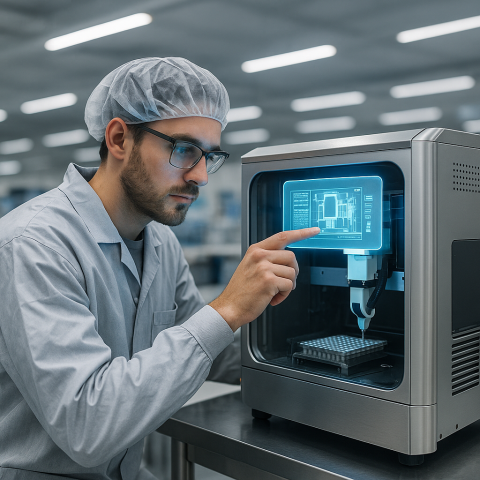
Not Just Green. Gritty. Grounded. British.
Let’s be honest — battery recycling isn’t the kind of thing that lights up a room. It’s not shiny. It’s not sleek. It doesn’t scream “unicorn.” But sometimes the most important startups are the ones doing the dirty work.
Mint Innovation, a West Midlands-based team of chemists, engineers, and quietly obsessive optimists, just launched a £8.1 million government-backed pilot in partnership with Jaguar Land Rover. Their mission? To extract critical metals — lithium, cobalt, nickel — from dead EV batteries using a process so clever it almost feels organic: bioleaching. Think of it as mining, but with microbes.
Why does this matter now? Because the UK’s green dreams rely on more than wind farms and press releases. We’re on a countdown to 2035 — when petrol and diesel are out, and electric is everything. But without a local supply chain for battery materials, we’re building a house with no bricks.
Mint doesn’t just clean up waste. They rewire value. Their process turns urban junk into industrial-grade feedstock. And they’re doing it not with fanfare, but with reactors, spreadsheets, and a kind of industrial humility I find deeply moving.
If Britain wants to stay relevant in clean tech — not just consume but produce — this is the sort of infrastructure we’ll need. It’s not glamorous. It’s essential.
"In a world chasing the future, Mint is quietly salvaging what we already threw away."
2. Bitfount (London)

The Cure for Data Paralysis
Here’s the problem: medical breakthroughs depend on data — mountains of it. But most of that data sits behind locked doors. Privacy laws, hospital silos, ethical landmines… you name it. So we wait. And people stay sick. Not because we don’t know the answers, but because we can’t reach the puzzle pieces.
Bitfount, a London-based startup, looked at that mess and didn’t flinch. Instead, they asked: what if we could collaborate without sharing? Not in theory — but in practice. In July, they raised €6.8 million to build exactly that.
Their platform uses federated machine learning — which sounds fancy, but here’s what it means: researchers in different parts of the world can train AI models on each other’s data, without ever moving it. The data stays put. The insights travel. No central servers. No data dumps. Just encrypted queries, secure compute layers, and a deep respect for patient dignity.
It’s already being trialled in NHS-affiliated institutions and cross-border research groups. Not as a side project — but as a lifeline. In areas like cancer genomics, where speed matters but trust matters more, this could change how the world cooperates.
This isn’t another “AI for healthcare” slide deck. It’s infrastructure for healing.
"They didn’t just solve a technical problem. They untied a moral knot."
3. The ValueCare Group (London)

A Watchful Eye, Without the Coldness
We talk a lot about ageing populations. What we don’t talk about is fear. The fear of collapsing alone. The fear of not being noticed. The quiet dread that builds when you live with a chronic condition and no one’s really watching.
The ValueCare Group wants to change that — gently. Their system, MICA, isn’t a bracelet that beeps or a panic button you forget to press. It’s a wearable that listens. Learns. Learns your patterns, your baseline, the little quirks that make you you — and flags when something’s off.
In July, MICA entered live trials across NHS sites and university hospitals. But this isn’t about pilot programs and press releases. This is about someone’s mum, someone’s neighbour, someone’s partner getting help before they hit the floor. Before the cough becomes pneumonia. Before the irregular heartbeat becomes an ambulance ride.
The system works with caregivers, not against them. It integrates with real workflows. Sends quiet nudges. Raises calm alerts. It’s not built for Silicon Valley. It’s built for Burnley. For Bexleyheath. For real lives lived behind ordinary doors.
If it succeeds, MICA could redefine what we mean by “care” — moving from reaction to prevention, from presence to true watchfulness.
"Sometimes the best kind of care is the kind you never have to ask for."
4. Alchemie Technology (Cambridge)
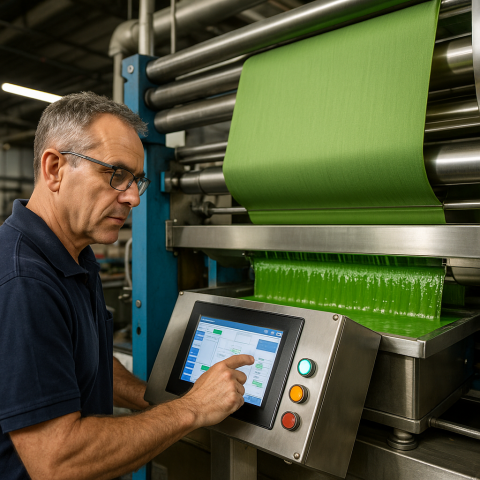
Dye Hard, Dye Clean
You probably haven’t thought much about how your jeans got their colour. That’s alright — most people haven’t. But if you ever followed the trail back to the factory, you’d find rivers choked with chemical runoff, tanks of wasted water, and a process that still runs like it’s 1950. Ugly truth: fashion dyes are filthy.
Alchemie Technology is trying to change that, and they’re doing it not with slogans, but with hard science. In July, their flagship machine — the Novara — entered full-scale deployment in textile plants across Europe. It doesn’t dye fabrics by soaking them. It uses precision-controlled jets and targeted heat to bond colour to cloth, without ever needing a wash bath. Translation? No wastewater. No sludgy dyes. No downstream guilt.
It’s fast. It’s clean. It’s scalable. And it’s not just for catwalk couture — it’s built for upholstery, uniforms, and everyday basics. Alchemie’s partnerships stretch from Portugal to Vietnam, and the tech is already turning heads at major global brands who are tired of greenwashing and ready for real action.
The dye industry isn’t exactly sexy. But it’s foundational — and if Novara catches on, we might look back at this moment as the beginning of a very different future for how we wear colour.
"When fashion gets cleaner, it won’t be because the catwalk asked. It’ll be because someone redesigned the machine."
5. Due (London)

Global Payments, Local Muscle
Cross-border payments are a nightmare. Always have been. Bank fees, delays, conversion chaos, regulatory minefields — it’s like trying to send money through a hedge maze. And yet, in 2025, it’s still how freelancers get paid, marketplaces settle bills, and contractors collect their due. Someone had to fix it. Due decided to.
They’re not flashy. Based in London, this team isn’t chasing headlines. In July, they quietly raised a £3 million extension to their seed round. No buzzwords. No hype. Just substance. Their platform offers stablecoin-based international transfers — fast, traceable, and cost-efficient — through an API-first design that slips neatly into the backend of any service. Think of it as plumbing for modern commerce.
But this isn’t crypto theatre. These are fiat-backed digital currencies, regulated and boring by design. The kind that won’t give your accountant heart palpitations. Due handles the compliance, the licensing, the legal minefields, so their clients don’t have to. And they do it with the calm, unshakable confidence of people who’ve seen how bad legacy systems really are.
Behind the scenes are veterans from Revolut, top banks, and cross-border fintechs — people who’ve carried the scars of clunky infrastructure and decided it was time to build something better. They’re not chasing the next shiny app. They’re laying tracks.
Whether it’s paying a copywriter in Kenya, settling invoices across borders, or enabling marketplaces to onboard global sellers, Due isn’t shouting. They’re listening. Then building. Then moving money like it should have moved a decade ago.
"Fixing the future sometimes means going back to the basics — and doing them right."
Top 5 Global Startups
6. Varda Space Industries (USA)
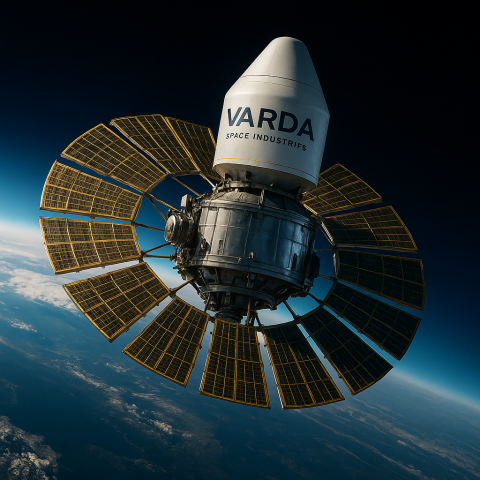
The Lab Above It All
It sounds like science fiction: manufacturing pharmaceuticals in space. But for Varda Space Industries, it’s not fiction — it’s delivery logistics. In July, they closed a staggering $187 million Series C round to expand their in-orbit drug production program. Why space? Because microgravity does what Earth can’t: it lets molecules grow, combine, and purify without the interference of gravity-driven sedimentation or convection. In plain terms, it’s cleaner, purer, and sometimes entirely new.
They’ve already launched capsules, brought them back, and extracted pharmaceutical-grade materials that outperform their Earth-bound equivalents. It’s not just R&D anymore — it’s a supply chain. Varda is betting that as biotech continues its search for exotic compounds, orbital manufacturing will be the place where things get real.
Beyond the novelty, there’s scale. Varda isn’t building bespoke science projects — they’re building repeatable, manufacturable modules that can integrate into commercial production.
"They didn’t just leave gravity behind. They left convention behind with it."
7. MAUI Imaging (USA)

The One Time You Can’t Afford to Be Wrong
There’s a moment, just before the panic sets in, when a doctor stares at a blurry scan and knows they’re guessing. It’s not negligence. It’s limitation. Ultrasound has always been the best bad option — portable, safe, fast… and painfully vague.
MAUI Imaging didn’t try to tweak that formula. They threw it out.
This is a story that doesn’t start in a lab. It starts in an emergency room, or maybe in a military tent, with someone bleeding out and the standard tools not seeing enough. A father, a son, and two decades of obsessive engineering later — they gave the medical world a second chance at a first look.
What they’ve built isn’t just a better image. It’s a new way of seeing. Their custom transducers and signal architecture don’t flinch at bone or gas. They render the hidden visible — in real time, in the field, in the moment between decision and disaster.
In July, they raised $14 million not to scale a business, but to reach. More clinics, more ambulances, more battlefield kits. Because the truth is brutal: lives are lost every day to bad imaging. Not bad doctors. Not bad intentions. Just tools that weren’t good enough when seconds mattered most.
MAUI doesn’t talk much. They just hand you a screen, and suddenly the shadows are gone. It’s not magic. It’s clarity — earned, not granted.
"Some inventions save lives. Others save the people who have to make the call."
8. Aidoc (USA)

Seconds Matter. So Does Certainty.
Every ER doctor knows the moment: that half-breath between scan and diagnosis. That sliver of time when you’re staring at pixels and trying to see a life — a stroke blooming, a clot travelling, a bleed expanding. It’s a brutal calculus: act fast, or lose everything.
Aidoc exists for that moment.
In July, the Israeli-American healthtech company raised $150 million to expand its AI platform across major hospitals in the US and beyond. But this isn’t “AI in healthcare” fluff. Aidoc’s tech is already FDA-cleared. Already running. Already saving lives. It scans radiological images in real time — flagging intracranial haemorrhages, pulmonary embolisms, cervical spine fractures — all before a human could even click open the file.
And it doesn’t stop there. Aidoc integrates with patient flow systems, alerting staff, updating dashboards, routing cases faster. It’s like adding a triage expert to every team — one who never sleeps, never blinks, never burns out.
Of course, it’s not perfect. No AI is. But what Aidoc gets right is its humility: it’s not trying to replace radiologists — it’s trying to buy them time. Time to think. Time to act.
Because in the ER, time isn’t just money. It’s breath. It’s memory. It’s life.
"They didn’t build a machine. They built a pause that saves everything."
9. Dash Bio (USA)
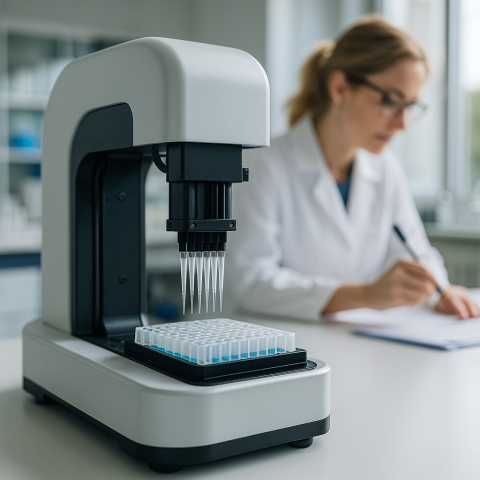
Not a Breakthrough. A Break from Breaking Down.
In science, not all revolutions come in blaze and glory. Some arrive in silence — the silence that falls when a task that once drained you, just works.
Walk into any bio lab and you’ll see it: a researcher hunched over a bench, pipetting, measuring, calibrating, rechecking. Again. Again. And again. It’s not the stuff that makes headlines, but it’s what makes the work real — and excruciating. At some point, the bottleneck isn’t the experiment. It’s the human.
Dash Bio understands that. Their machine doesn’t try to replace the scientist. It simply lets them breathe.
Their benchtop automation unit — compact, affordable, and refreshingly unassuming — handles ELISA assays with a level of consistency that turns chaos into clarity. No frills, no showmanship. Just precision, run after run. In July, they secured $11 million to scale production, not with dreams of conquest, but with the calm ambition of a team that knows what labs actually need.
It’s already in the field. Not in concept decks or staged demos, but on real benches, running real tests, saving real hours. And no, it won’t inspire a TED Talk. But it will let a postdoc go home before midnight — and come back tomorrow with a little less burnout in their eyes.
Sometimes, innovation isn’t about doing something new. It’s about finally doing the old things well.
"The future didn’t walk in wearing a cape. It sat on the desk, clicked ‘Start’, and quietly did the job no one else wanted."
10. Spear AI (USA)
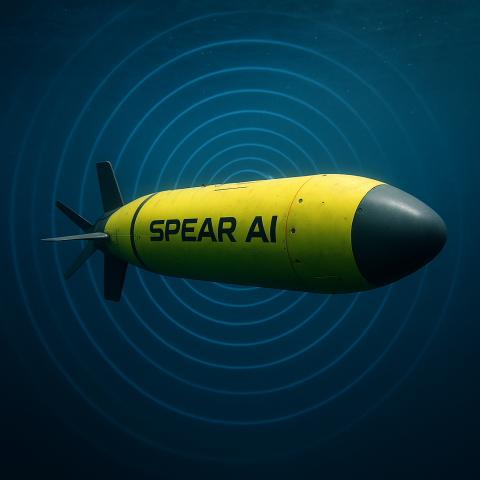
When the Deep Starts Talking
The ocean doesn’t shout. It hums. It vibrates. It rumbles with signals we can’t quite decipher — at least, not without the right ears. For submarines, undersea cables, offshore pipelines, and endangered species, those sounds are life and death. Spear AI thinks it’s time someone really listened.
In July, the U.S.-based startup came out of stealth with $2.3 million in seed funding and a $6 million contract with the U.S. Navy. Their platform turns underwater acoustics into actionable insights. Not by flooding you with sonograms and noise — but by interpreting them, using AI trained on countless hours of sonar, marine traffic, and threat signatures. The result? Real-time classification of what’s out there, whether it’s a hostile drone, a migrating whale, or a corroding pipe that’s about to split.
But it doesn’t stop at defence. Spear is already exploring applications in port security, pipeline monitoring, and ocean conservation. The same algorithm that flags a torpedo can also spot an illegal trawler or warn of underwater landslides.
They’re building a listening layer for the ocean. A kind of deep-sea radar — one that doesn’t blink, doesn’t tire, and doesn’t drown in data.
"The ocean has been speaking all along. Spear just gave us a way to understand."
Cast Your Vote
Which of these startups deserves the July spotlight? We’re inviting readers to vote on their favourite — not just the flashiest, but the one you’d bet on.
Vote here
Editor’s Pick
The ValueCare Group (London)
Care That Connects
While others chase innovation, The ValueCare Group returns to something timeless — human connection. Their home care model pairs clients with dedicated caregivers, building real relationships instead of rotating shifts.
No buzzwords. No AI hype. Just consistent, compassionate support for those who need it most.
“Innovation isn’t always about technology. Sometimes, it’s about remembering what matters.”